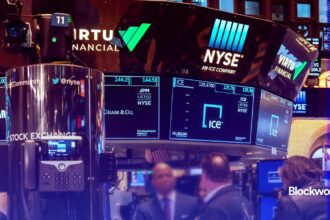JPMorgan Wary of Stablecoin Market Fragmentation, Eyes Potential Digital Currency Launch
In brief
- JP Morgan executive Emma Lovett warns that the stablecoin market is experiencing “overcrowding” and fragmentation.
- The bank recently filed a trademark for ‘JPMD,’ raising speculation about launching its own digital currency.
- Major US banks are exploring stablecoin partnerships, though plans are contingent on pending regulatory legislation.
Executive Director Emma Lovett Cautions Against Stablecoin Fragmentation
Speaking at the DigiAssets 2025 conference in London, JP Morgan Chase Executive Director Emma Lovett voiced concerns about a potentially “overcrowded” stablecoin market, urging industry stakeholders to consider the risks of excessive fragmentation. Lovett, leading the firm’s markets distributed ledger technology and credit efforts, stated, “We all know that we’re in the middle of this big stablecoin hype… But I think, two or three years from now, it’ll be interesting to see how the market evolves in terms of who has issued their own stablecoins and who is using what.”
Potential JP Morgan Digital Currency Signals with Trademark Filing
Less than 48 hours after JP Morgan registered a trademark for ‘JPMD’, Lovett indicated the name is intended for use in payments and related “virtual currency, digital currency.” While confirming the potential launch, she distinguished it from stablecoins, describing them as “a bridge between fiat and crypto.” The rapid trademark filing is viewed by observers as a significant development hinting at active exploration into JP Morgan’s direct offering in the digital currency space.
Banks Explore Stablecoin Partnerships Amid Regulatory Uncertainty
Attention recently focused on reports suggesting several major US financial institutions, including JP Morgan, Bank of America, Citigroup, and Wells Fargo, are exploring a collaborative partnership to co-launch a stablecoin. Sources told The Wall Street Journal that these multi-institutional plans, if executed, would depend critically on the outcome of pending stablecoin legislation. Banks await clarity on the legislative front, scheduled for a vote, to determine the feasibility and structure of their stablecoin endeavors.
JPMorgan’s JPMD Trademark: Is a Solo Move Coming?
JPMorgan filed for the JPMD trademark amidst reports linking the bank to a potential multi-institution stablecoin venture. However, Lovett’s recent comments underscore a shift in strategic thinking. While the regulatory environment remains a key factor for collaborative efforts, the JPMD trademark signals a possibility of JPMorgan operating independently, leveraging its existing clientele (“first line of defence businesses”) to issue a JP Morgan-branded digital currency. This potential dual track – exploring both an independent launch and partnerships – reflects the cautious optimism present in the sector, contingent upon regulatory greenlighting.
GENIUS Act and Circle’s IPO Fuel Market Optimism
The current enthusiasm for stablecoins is largely fueled by Senate consideration of the bipartisan GENIUS Act, designed to establish a regulatory framework for stablecoins and digital assets. This legislative momentum is further bolstered by the high-profile IPO of stablecoin issuer Circle (USDC), often described as a “moon landing moment.” Its success, accounting for roughly a quarter of the stablecoin market capitalization, highlights the sector’s significant influence despite ongoing regulatory debates.
Competing Visions: US Regulation Seen as Key for Global Digital Leadership
The anticipated passage of the GENIUS Act has generated considerable excitement, according to those familiar with the matter. Executives at the conference acknowledged the bill’s potential to strengthen the USD’s position and bolster US leadership in digital assets. This perspective is echoed by policymakers, including White House Council of Advisers on Digital Assets Executive Director Bo Hines, who predicted the legislation would clarify regulations, improve payment systems, establish US dominance, and safeguard the dollar. Separately, a European asset management giant warned that the EU risks being a “flyover zone” without comparable regulatory advancements.
Additional reporting by Stephen Graves












